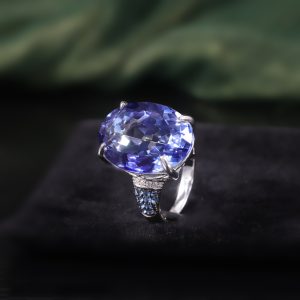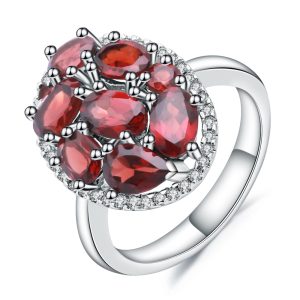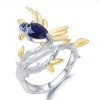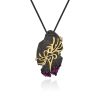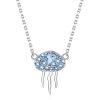The Craftsmanship of Garnet Jewelry: From Raw Stone to Brilliant Gem
Garnet, known for its deep red hue and symbolic meaning of love and loyalty, has long been cherished in the world of jewelry. The journey from a rough garnet crystal to an exquisite piece of jewelry involves intricate craftsmanship, blending traditional artistry with modern precision cutting techniques.
🔍 1. Selection and Classification of Raw Garnet
The quality of garnet determines the brilliance of the final jewelry piece, making the selection process crucial.
💎 Key Factors in Garnet Selection:
✔ Color – Typically deep red (almandine), purplish-red (rhodolite), or orange-red (spessartine).
✔ Clarity – High-quality garnets should be free of visible cracks and inclusions.
✔ Crystal Structure – Well-formed crystals with minimal fractures are ideal for cutting and setting.
Once selected, garnets are classified for different types of jewelry, such as rings, pendants, earrings, and bracelets.
🔷 2. Cutting Techniques
Cutting is one of the most important processes, as it determines the garnet’s brilliance and optical performance. With a refractive index ranging from 1.72 to 1.94, garnet benefits greatly from precise faceting.
✂ Common Garnet Cuts:
- Round Brilliant Cut – Maximizes light reflection for optimal sparkle.
- Oval Cut – A classic choice that enhances garnet’s natural radiance.
- Emerald Cut – Highlights transparency and depth of color.
- Cushion Cut – Soft, vintage appeal, ideal for larger stones.
Expert lapidaries carefully calculate each facet’s angle to bring out the best in the stone’s color and brilliance.
✨ 3. Polishing Process
After cutting, garnet undergoes an extensive polishing process to remove micro-abrasions and enhance its surface shine.
🔹 Polishing Techniques:
- Traditional hand polishing with diamond powder or aluminum oxide.
- Advanced machine polishing for precise surface finishing.
The polishing stage is essential to achieving a mirror-like finish, which allows garnet to exhibit its full beauty under different lighting conditions.
💍 4. Setting Techniques
Once polished, the garnet is carefully set into its jewelry design. The choice of setting impacts both the durability and aesthetic of the final piece.
🔗 Common Garnet Settings:
- Prong Setting – Classic and secure, allowing maximum light exposure.
- Bezel Setting – Offers protection, ideal for everyday wear.
- Halo Setting – Enhances the stone’s brilliance by surrounding it with smaller gems.
- Invisible Setting – Creates a seamless, dazzling effect with no visible metal frame.
During the setting process, jewelers ensure that the garnet is firmly secured while maintaining its exposure to light for maximum brilliance.
🔥 5. Enhancement and Treatment
Unlike many gemstones, garnets are typically not subjected to artificial enhancements. However, some varieties may undergo mild heat treatment to improve color uniformity and saturation.
📌 Note: Natural, untreated garnets hold higher value than treated stones, making them a preferred choice for collectors and fine jewelry enthusiasts.
🧐 6. Quality Inspection and Final Presentation
Before reaching the market, each garnet jewelry piece undergoes rigorous quality control (QC) to ensure craftsmanship excellence.
✔ Checking stone security in its setting
✔ Assessing gemstone luster and color consistency
✔ Using magnification to inspect for hidden flaws or imperfections
After passing inspection, the jewelry piece receives a final cleaning and professional packaging, making it ready to be worn and cherished.
🌟 Conclusion: The Artistry Behind Garnet Jewelry
From raw crystal to finished masterpiece, every garnet jewelry piece is the result of nature’s artistry and human craftsmanship.
Whether you are drawn to the deep, wine-like red of almandine, the regal purple of rhodolite, or the fiery orange of spessartine, garnet jewelry radiates timeless elegance and passion.
💬 Which cut or style of garnet jewelry do you prefer?









